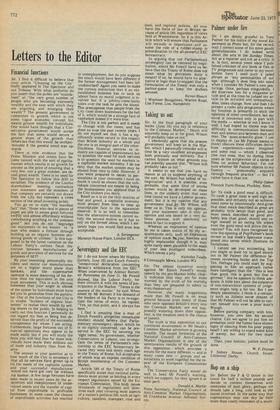Financial functions
Sir, I find it difficult to believe that your article "Cleaning up the City" really appeared in The Spectator and not Tribune. With what authority do you assert that the public are "scandalised" at "the very great number of people who are becoming extremely wealthy and the ease with which they are acquiring and enlarging their wealth"? The present government is committed to growth which is not some vague economic concept but means greater wealth for individuals. One would have thought that a Conservative government would accept the fact that some would secure a greater share of the growth than others but that this would be unobjectionable if the general trend was upwards.
There is now evidence that the Prime Minister and others have become tainted with the sort of egalitarianism which results in no growth for anyone as the price of ensuring that a very few, not a great number, are de' nied great wealth. There is no need for The Spectator to follow this drift to socialism. The evidence of the Lonrho shareholders' meeting contradicts your statement and the members of that company are certainly not drawn from the City but represent a cross section of the small investing public.
You go on to state "the manifest fact" that "those who deal in pieces of paper are able to amass great fortunes swiftly and almost effortlessly without contributing anything to the common good" but you do not "begrudge
tne enjoyment or nis wealth to -a man who makes a fortune through
building up an organic business pro ducing goods or utilities." Is this supposed to be the latest variation on the Labour Party's curious fiscal distinction between manufacturers of goods and providers of services for the purposes ot SET?
By your reasoning, presumably distillers and motor car manufacturers are on a higher moral plane than bankers, and the supermarket operator is more deserving of his fortune than his equivalent in the unit trust movement. This is such obvious nonsense that your anger at abuses of the systen by individuals must have led you to generalise from the particular. One of the functions of the City is to enable "builders of organic businesses" to realise their wealth by selling shares to the public. In helping to carry out this function I personally do not regard my fees as being less deserved than the profit of the successful entrepreneur for whom I am acting. Furthermore, large fortunes out of financial operations may appear to be made easily but if you will study the facts you will find that far more individuals have made their millions out of trade and industry than from finance.
The answer to your question as to how much of the City is necessary is that all its services have grown up to till the needs of the capitalist system and your successful manufacturer would not have got very far without his banker. A few large fortunes have been made in recent years by the acquisition and redeployment of undervalued assets and the transfer of capital from unprofitable to profitable businesses. In some cases the closure of unprofitable activities has resulted in unemployment, but do you suppose the result would have been different if the former management had been left undisturbed? Again you seem to make the curious distinction that if an oldestablished business has to sack its labour force no moral judgment is involved but if a johnny-come-lately takes over the task he gets the blame.
This presupposes that. people from the City close down businesses for the hell of it, which would be a strange face of capitalism indeed if it were true. • The City is not perfect and it needs to change with the times, and has done so over the past twenty years.. I do not myself see that it has a significantly worse record in this respect than British industry as a whole and the one is an integral part of the other. Doubtless financial services to industry are capable of improvement but to question the need for such services is to question the need for markets in a capitalist market economy. I do not deny that the market system may be abused from time to time. However, if you were prepared to resort to personalities in your criticisms 1 have no doubt it could be shown that the individuals concerned are nearer to being the businessmen you applaud than to the City slickers you decry.
Based as it is on the twin motives of fear and greed, a capitalist economy must present from time to time an unacceptable face to the squeamish observer. It is as well to remember that the alternative system cannot satisfy the second motive so it has to rely on the former alone, which I sincerely hope you would find even less acceptable. A. Scrimgeour Mansion House Place, London EC4.


































 Previous page
Previous page